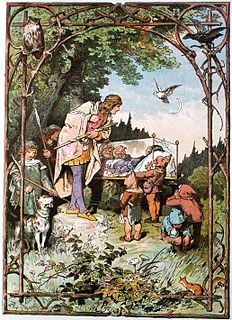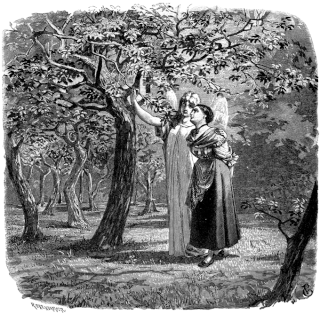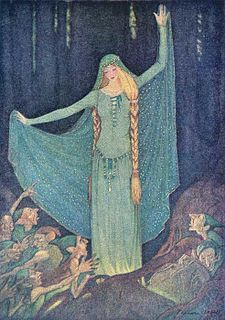Related Research Articles

The Brothers Grimm, Jacob (1785–1863) and Wilhelm (1786–1859), were German academics, philologists, cultural researchers, lexicographers, and authors who together collected and published folklore. They are among the best-known storytellers of folk tales, popularizing stories such as "Cinderella", "The Frog Prince", "Hansel and Gretel", "Little Red Riding Hood", "Rapunzel", "Rumpelstiltskin", "Sleeping Beauty", and "Snow White". Their first collection of folk tales, Children's and Household Tales, began publication in 1812.

"Snow White" is an 18th-century German fairy tale that is today known widely across the Western world. The Brothers Grimm published it in 1812 in the first edition of their collection Grimms' Fairy Tales and numbered as Tale 53. The original German title was Sneewittchen, a Low German form, but the first version gave the High German translation Schneeweißchen, and the tale has become known in German by the mixed form Schneewittchen. The Grimms completed their final revision of the story in 1854.

"The Elves and The Shoemaker" is a set of fairy tales collected by the Brothers Grimm about a poor shoemaker who receives much-needed help from three young helpful elves.

"The Goose Girl" is a German fairy tale collected by the Brothers Grimm and first published in Grimm's Fairy Tales in 1815. It is of Aarne-Thompson type 533.

"Frau Holle" is a German fairy tale collected by the Brothers Grimm in Children's and Household Tales in 1812. It is of Aarne-Thompson type 480.

Grimms' Fairy Tales, originally known as the Children's and Household Tales, is a German collection of fairy tales by the Grimm brothers or "Brothers Grimm", Jacob and Wilhelm, first published on 20 December 1812. This first edition contained 86 stories, and by the seventh edition in 1857, it had 210 unique fairy tales.

The White Snake is a German fairy tale collected by the Brothers Grimm and published in Grimm's Fairy Tales. It is of Aarne–Thompson type 673, and includes an episode of type 554.

"The Three Spinners" is a German fairy tale collected by the Brothers Grimm in Grimm's Fairy Tales. It is Aarne–Thompson type 501, which is widespread throughout Europe.

"The Singing, Springing Lark", "The Singing, Soaring Lark", "The Lady and the Lion" or "Lily and the Lion" is a German fairy tale collected by the Brothers Grimm, appearing as tale no. 88.

The Iron Stove is a fairy tale collected by the Brothers Grimm, as tale number 127. It is Aarne–Thompson type 425A, the animal bridegroom. Dorothea Viehmann prepared the story for the Grimms' collection.
Foundling-Bird is a German fairy tale collected by the Brothers Grimm, number 51.

"The Robber Bridegroom" is a German fairy tale collected by the Brothers Grimm, tale number 40. Joseph Jacobs included a variant, Mr Fox, in English Fairy Tales, but the original provenance is much older; Shakespeare alludes to the Mr. Fox variant in Much Ado About Nothing, Act 1, Scene 1:
"The Water Nixie" or "The Water-Nix" is a fairy tale collected by the Brothers Grimm, tale number 79. It came from Hanau.
"Mother Trudy" is a German fairy tale collected by the Brothers Grimm, tale number 43. It is Aarne-Thompson type 334, at the witch's house.

"The Hut in the Forest" is a German fairy tale collected by the Brothers Grimm. Andrew Lang included it in The Pink Fairy Book (1897). It is Aarne-Thompson type 431.

"The Girl Without Hands" or "The Handless Maiden" or "The Girl With Silver Hands" or "The Armless Maiden" is a German fairy tale collected by the Brothers Grimm. It is tale number 31 and was first published in the 1812 edition of Children's and Household Tales. The story was revised by the Grimm brothers over the years, and the final version was published in the 7th edition of Children's and Household Tales in 1857. It is Aarne-Thompson type 706.
"The True Bride" or "The True Sweetheart" is a German fairy tale collected by the Brothers Grimm in Grimm's Fairy Tales as tale 186.

"The Two Kings' Children" is a German fairy tale collected by the Brothers Grimm in Grimm's Fairy Tales, tale number 113.

"Mary's Child" is a German fairy tale collected by the Brothers Grimm in Grimm's Fairy Tales in 1812. It is of Aarne-Thompson type 710.
"Lazy Henry" or "Lazy Heinz" is a German fairy tale collected by the Brothers Grimm in Grimm's Fairy Tales, number 164. It was first added in the third edition.
References
- ↑ Jacob and Wilheim Grimm, Household Tales, "Odds and Ends"
- ↑ D.L. Ashliman, "The Grimm Brothers' Children's and Household Tales (Grimms' Fairy Tales)"